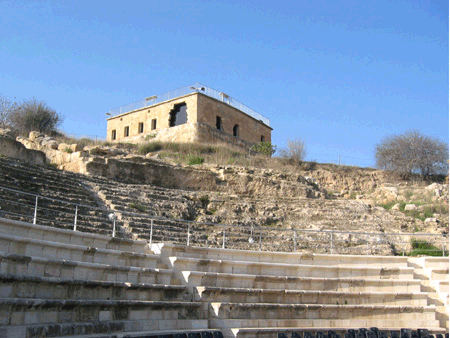When we read in Matt. 6:1-8;16-18, curiously, Jesus demonstrates knowledge of theatrical terminology and practices which would seem out of place in first century Jewish contexts. How did Jesus know what a “hyporcrite,” literally one who wears a mask or plays a role, meant when he lived in a largely rural town? Did Jesus go to theater camp? It may sound a bit cheeky, but the truth may not be so far off. Richard A. Batey in “Jesus and the Theatre,” New Testament Studies vol. 30 no 4, O 1984, pp. 563-584, makes a strong case that Jesus knew Greek theatrical terms such as hypocrite, “hupocritai” occurring in Matt 6, vv. 2, 5 and in 16 “hupocrites”, because he lived close to the Hellenistic Roman city of Sepphoris. How is this significant?
Sepphoris was founded by Herod Antipater as “the seat of his power and centre of culture” in Galilee and Perea. Here, the remains of a Greco-Roman style theater have been found in the style of Vitruvius, a great architectural mind who built the Roman water system. Herod the Great had sent his children to Rome to be educated and trained in the ways of Roman politics and culture. When Herod Antipas returned and subsequently took control as one of four tetrarchs or rulers of the region after his father died, he founded a city resplendent with Roman luxury and opulence, symbolizing the embodiment of Roman culture he had experienced while in the capital of the empire. Being that the city was only an hour’s walk from the town of Nazareth and that Nazareth was along the main highway south of Sepphoris makes it likely that Jesus traveled there. Jesus was involved in a trade, carpentry, that would require commerce with such places and it is likely Jesus travelled to Sepphoris to conduct business and knew some Greek in order to carry out regular business deals. It is here that the young Jesus may have talked to actors or seen a performance of Greek tragedy. One can imagine Jesus taking a break from his hard work and listening in on a practice between actors, seeing them getting ready for a show or catching the show with his dad while they were in town.
In Jesus’ own description of the hypocrites in relation to fasting, Matt. 6:16-18, he describes how they paint their faces, the same way actors prepared for their tragic roles and comedies. Additionally, according to Craig Evans, the description of “do not let your left hand know what your right hand is doing” in Matt 6:3 is actually instructions about how to use one’s hands in performance. Clearly Jesus knew something about the theater and some of its mechanics. The remains of a theater in Sepphoris has been found and dated to the period of Antipas based upon Hasmonean coins discovered in the orchestra area. (Coins were often thrown as praise for good performances, much like roses today at ice skating events.) Hupocritesoccurs thirteen times in Matthew compared to once in Mark and three times in Luke. The theme became important for Matthew in delineating true worship from false piety and he uses it often. This would not make sense unless Jesus knew what the term meant. Even more so, Jesus’ indictment of the pharisees and teachers of the law, the religious folk, as “hypocrites” would be particularly biting as the religious Jewish elite saw acting as a form of lying. This is why they are offended when Jesus accuses them of false piety. He is calling them a bunch of liars. Pretty in your face. Matthew utilizes this theme to great effect throughout his Gospel. It would appear that Jesus had to have known some kind of Greek and more specifically, Greek theatrical terms, in order to make the kind of accusations he was making. How did he acquire such Greco-Roman terminology? Did Jesus go to theater camp? The idea makes me smile just a little bit. Regardless of how he came to know the terms, Jesus certainly understood what they meant and used them to great effect. Jesus didn’t “act the fool” but told it straight. That’s why he was so controversial.
